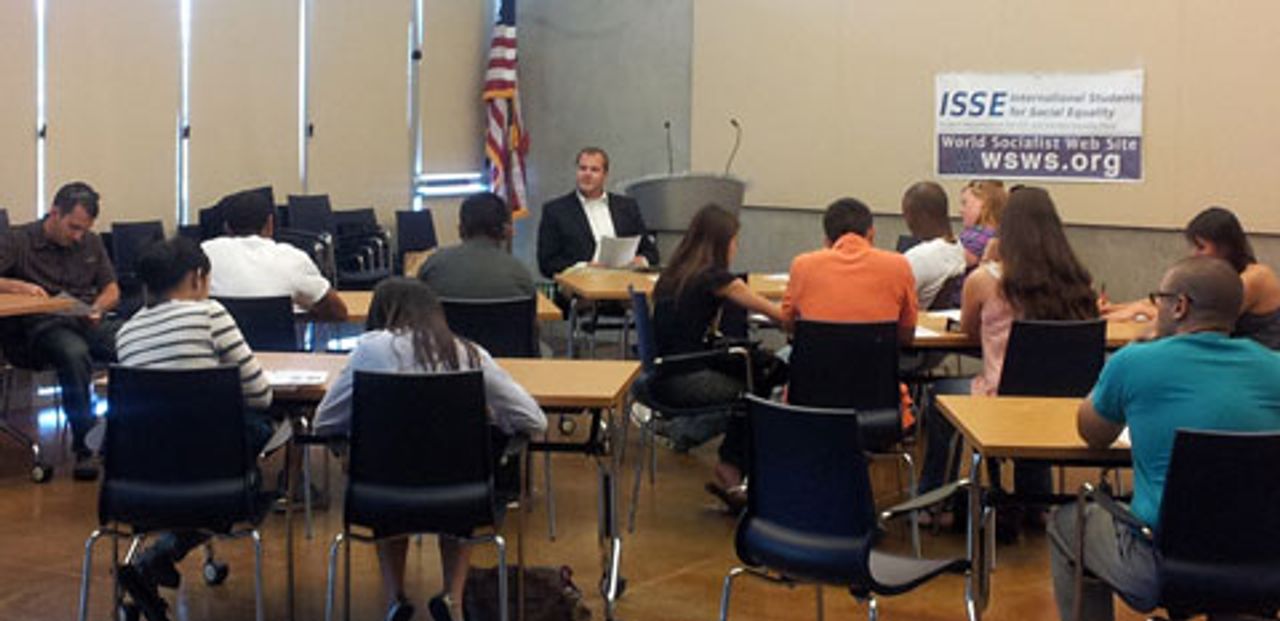On Tuesday, June 26, students gathered at Valley Hi-North Laguna Library in Sacramento, California to discuss the California budget crisis and the 2012 SEP election campaign. The meeting was attended by students from Consumnes River Community College.
 The meeting in Sacramento
The meeting in SacramentoThe meeting took place in the midst of the worst budget crisis in California history. Democrats in the state, including Governor Jerry Brown, have led the way in slashing billions from state services for workers of all ages. Though community college fees have already risen precipitously in recent years, new increases of up to 25 percent are being planned for the next school year.
The meeting was addressed by Kevin Kearney, a member of the Socialist Equality Party, and consisted of a careful review and discussion of the core principles of the SEP’s campaign, Jerry White for president and Phyllis Scherrer for vice president. While most of the students in attendance expressed limited familiarity with socialism, many eagerly questioned Kearney about the basic tenants of socialism as a scientific and political struggle for the emancipation of the working class, the history of the struggle for socialism and the economic crisis.
After reviewing the economic and political situation, Kearney explained that the working class is the only class capable of solving the problems caused by the breakdown of capitalism. “The Socialist Equality Party calls for a break with all big business parties—Democrats and Republicans—and for the political independence of the working class. Only in this way will workers be able to carry out the tasks essential to resolving the worst economic crisis since the 1930s.”
Kearney described those tasks: “Private ownership of the banks, major industries and critical resources must be abolished once and for all and replaced with public ownership guided by the rational, genuinely democratic economic planning and for the benefit of society as a whole, not the profit of a few.” He emphasized that the workers themselves must control the global economy.
Kearney also spoke of the immense growth of social inequality. He highlighted Oracle CEO Larry Ellison’s recent purchase of a Hawaiian Island while a nearby city, Stockton, falls into bankruptcy as an example of the inability of capitalism to rationally organize the resources of a complex, modern society. During the discussion, he stressed that decent-paying jobs, quality education, affordable housing, universal health care, a dignified retirement and access to culture were “inalienable social rights,” but that these were not compatible with capitalism.
In response to a question from one student, Mindy, about how such changes might affect the national interests of the US, Kearney replied by repeating the first principle of the campaign: the interests of the working class cannot be defended on the basis of a nationalist program. This lead to a discussion on the changes in the production process over the last several decades and how this has greatly integrated the global economy and workers internationally, laying the basis for an international struggle against capitalism.
Ricky expressed his frustration with the concentration of power in the hands of a smaller and smaller number of large corporations: “What do you propose to do against monopolies like Walmart and AT&T that drive small businesses bankrupt and bring competition down…Shouldn’t we pass a law to stop them from doing this?"
Kearney explained that corporate power over economic life could not be changed simply passing a law in Washington DC. After asking rhetorically, “Which party would do that? Would the Democrats rein in big, unaccountable corporate entities?” He pointed out that the Obama administration had consistently broken records in corporate donations. He then insisted that such change could only be carried out through the independent political mobilization of the working class in the struggle to reorganize all of economic life.
A handful of students stayed after the meeting to discuss the platform of the SEP in further detail. Three students, all current or former members of the armed forces, expressed frustration with the treatment that veterans receive when returning home.
“I joined the army because I want to make something of myself, and there wasn’t really anything else available,” one young student explained. After some discussion on the imperialist and criminal character of the US wars in Afghanistan, Iraq and Libya, a handful of the students voiced their interest in staying involved with the SEP’s 2012 presidential campaign.
